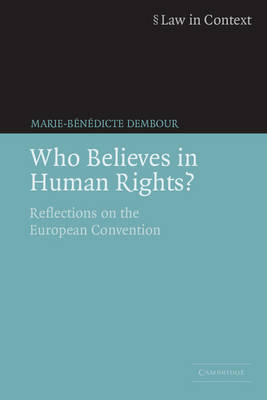
Who Believes in Human Rights?
Reflections on the European Convention
Seiten
2006
Cambridge University Press (Verlag)
978-0-521-68307-4 (ISBN)
Cambridge University Press (Verlag)
978-0-521-68307-4 (ISBN)
At one level an original and insightful commentary on the European Convention, this book is also a groundbreaking work of theory which challenges human rights orthodoxy. Its identification of four human rights schools proposes that we alternatively conceive of these rights as given, agreed upon, fought for or talked about.
Many people believe passionately in human rights. Others - Bentham, Marx, cultural relativists and some feminists amongst them - dismiss the concept of human rights as practically and conceptually inadequate. This book reviews these classical critiques and shows how their insights are reflected in the case law of the European Court of Human Rights. At one level an original, accessible and insightful legal commentary on the European Convention, this book is also a groundbreaking work of theory which challenges human rights orthodoxy. Its novel identification of four human rights schools proposes that we alternatively conceive of these rights as given (natural school), agreed upon (deliberative school), fought for (protest school) and talked about (discourse school). Which of these concepts we adopt is determined by particular ways in which we believe, or do not believe, in human rights.
Many people believe passionately in human rights. Others - Bentham, Marx, cultural relativists and some feminists amongst them - dismiss the concept of human rights as practically and conceptually inadequate. This book reviews these classical critiques and shows how their insights are reflected in the case law of the European Court of Human Rights. At one level an original, accessible and insightful legal commentary on the European Convention, this book is also a groundbreaking work of theory which challenges human rights orthodoxy. Its novel identification of four human rights schools proposes that we alternatively conceive of these rights as given (natural school), agreed upon (deliberative school), fought for (protest school) and talked about (discourse school). Which of these concepts we adopt is determined by particular ways in which we believe, or do not believe, in human rights.
Senior Lecturer in Law at the Sussex Law School, University of Sussex.
Table of cases; 1. Introduction; 2. The Convention in outline; 3. The Convention in a realist light; 4. The Convention in a utilitarian light; 5. The Convention in a Marxist light; 6. The Convention in a particularist light; 7. The Convention in a feminist light; 8. The human rights creed in four schools; 9. Conclusion: In praise of human rights nihilism; Appendices; Select bibliography; Index.
| Erscheint lt. Verlag | 19.10.2006 |
|---|---|
| Reihe/Serie | Law in Context |
| Zusatzinfo | 4 Tables, unspecified |
| Verlagsort | Cambridge |
| Sprache | englisch |
| Maße | 153 x 229 mm |
| Gewicht | 553 g |
| Themenwelt | Recht / Steuern ► EU / Internationales Recht |
| Recht / Steuern ► Öffentliches Recht ► Verfassungsrecht | |
| Recht / Steuern ► Öffentliches Recht ► Völkerrecht | |
| ISBN-10 | 0-521-68307-6 / 0521683076 |
| ISBN-13 | 978-0-521-68307-4 / 9780521683074 |
| Zustand | Neuware |
| Haben Sie eine Frage zum Produkt? |
Mehr entdecken
aus dem Bereich
aus dem Bereich
Buch | Hardcover (2024)
C.H.Beck (Verlag)
CHF 104,95


